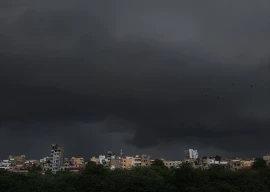
Only a nation with a dead conscience could have lived with such an obnoxious law specifically meant for a group of its own citizens without feeling guilty. We howl and bawl for the Palestinians and for the Muslims of Myanmar. But for the agony and pain that we continue to cause to these four million Pakistanis –– whom we credit for winning us half of Kashmir way back in the early days of our independence – we show no feelings at all. Shame on us.
Why am I talking about FCR at this point in time when Pakistan is surrounded by a multitude of problems, one more perilous than the other? I agree, on the face of it, it does sound untimely. But is it? I think any time is a good time to talk about righting a wrong. More so, when the wrong we are talking about concerns the people of the Federally Administered Tribal Areas (Fata), a section of which is up in arms against the state itself.
Under the FCR, residents of Fata are deprived of the right to appeal detention, the right to legal representation and the right to present evidence. And the collective responsibility and punishment clause imposes severe punishment on anyone in the tribal areas (now changed to family members, which in a tribal society means the entire tribe itself) for a crime committed by him or her relative, spouse, or even any other person from the same tribe and area. Innocent women, children and old people are known to have suffered and continue to suffer imprisonment for years under this clause. And it is well-nigh possible that the Taliban, in order to attain a high moral perch, are deliberately referring to such prisoners as non-combatants and asking their release as a condition for continuing the ongoing peace talks.
Under the current dispensation, the political agent in Fata or his deputy wield immense executive and judicial powers and no regulatory mechanism exists to hold his hand from misusing these powers. Like the police stations in Karachi, the offices of political agents are also said to be bought and sold at a premium.
Former president Asif Ali Zardari, to his credit, extended the Political Parties Order to Fata. Some political parties did put up their candidates in the last general elections held in May 2013. But ironically enough, while these elected Fata MNAs and senators can participate in the national legislative process, they have no powers to do the same for their own constituencies. Also, because most of these elected members belong allegedly to the families of the political agents or Maliks, they therefore, are said to feel more comfortable with the status quo and refrain from making any noise against the FCR or Article 247 (3).
One positive development on this front in recent times has been the formation of a Political Parties Joint Committee on Fata Reforms. It has proposed an 11-point recommendation, including local bodies polls, the future status of Fata to be decided by its people, abolition of Actions (in Aid of Civil Power) Regulation and the separation of executive and judicial powers. But the relevant authorities seem to be taking too long to make themselves available for a briefing on the progress so far made by the committee.
Strategic reasons are said to be what is holding up genuine reforms in Fata. But it is on the strategic front itself that these inhuman set of laws has failed to deliver, as despite the existence of these harsh laws all these years, the area has remained a lawless no-man’s land for criminals, and now a safe sanctuary for the militants waging war against Pakistan. So it would only be strategically helpful if opposition to the reforms is given up by you-know-who.
Published in The Express Tribune, March 19th, 2014.
Like Opinion & Editorial on Facebook, follow @ETOpEd on Twitter to receive all updates on all our daily pieces.
COMMENTS (16)
Comments are moderated and generally will be posted if they are on-topic and not abusive.
For more information, please see our Comments FAQ










1722244248-0/tlprrt-(1)1722244248-0-270x192.webp)

It is a good beginning. The FCR should go and FATA should have normal law of the Country. The cultural and social values of FATA should be respected. If necessary FATA should be a Province with whatever goes with it, to govern it. We should stop treating the FATA people as RED INDIANS.
@Shafirullah:
Now please write in few words, what your concerns are? The author has taken a major step in recognising the use of unjust laws which the Government of Pakistan has been applying for the people of the tribal territory despite the end of colonial era.
Rex Minor
Thanks for the writer and thanks the other who has given their input.I have few questions.If this hurt anyone for that I beg Pardons. 1)Is the concept of collective responsibly is law of the tribesmen or has been imposed by foreigners ? 2) Areh the evils mentioned above not more in Karachi as compared to FATA ? Is FCR is the law there? 3) Was there no one in the past i.e.from1947 to 1990 to think or write about the improvement in FATA system ? 3) Is there no intelectual in F ATA who has lived in FATA and write about the system? 4) Why were we silent during Afghan war 1980 to 9/11? 5) Is there any consensus on alternate system? 6) Are the words used are proper? For the sake of Allah help the people of FATA by the way as civilised nations.
2nd attempt for ET mod. As long as there are people like Mr Ziauddin calibre in the media and as long as the people in Khaki are kept away from the cities and population centres and the civilian administration is allowed to muddle through there is a hope for the people of Pakistan of varying cultures to become a Nation in time. Pakistan will require reforms in ist administration systems, judiciary and its military. It must have a team of WISE MEN, who regularly offer their advice to the Government.
Rex Minor
People of FATA do not want any Pakistani Law. Please ask them first. They want to keep their independence Period. Any one who does crime in Pakistan hides in FATA. All kidnapped persons are shifted to FATA..They do not want to pay any bills or taxes. Please ask them first. Shame on you to write with finding out facts. We should find solution rather blaming our self for the people who wants to transport you to 6th century by force.
"Shame on us." These are harsh words and that too in the title itself. Make constructive comments without beating ourselves on our heads. It has become fashionable to treat Pakistan as a punching bag. Desist.
Everyone seems to harp on "strategic consideration" and "strategic depth." But times, conditions, considerations have all changed the oft-parroted strategic assets, etc. are now only relics of the past.
Well-said, sir; it is indeed a shame.
The article is based on historic facts , but the suggestions are not likely to be endorsed by people of FATA themselves. They would never leave their autonomy and barter their concessions for the suggested reforms. Can any one imagine that people in FATA would like Government of Pakistan to replace Khasadars with Police, Jirga with court, Pay Taxes & bills for utilities. Become answerable for crimes to State, make a license for his weapon, pay registration fee for his car, drive imported & not the smuggled cars. Please correct me if I am wrong.
All colonial period laws must be repealed immediately so that the people of FATA are freed from usury and oppression. If strategic considerations are not shelved forthwith the consequences for the country would be grave. All laws and regulations are man made, treating them as sacrosanct will only enhance the misery.
The author says his suggestions are untimely then goes on defend that righting a wrong is never untimely. But even for righting a wrong an appropriate time is most effective for carrying out reforms.
excellent article ......
Its really appreciable to see such a note from the exective editor of the leading newspaper of Pakistan, who voiced again the criminal negligence of our law makers twords its people. It is to be remembered that FATA has a representation in our assembly where they can raise their voice for the injustice to their. BUT dear editor do u know there is FANA ( now Federally Administred GilgitBaltistan) too?? This is the most neglected part of Pakistan so far with minimal basic human rights with no representation in National Assembly of the country where they live. GB is governed like the way Great Britian governed the her colonies a century ago! So its time to give equal rights to every citizen of Pakistan. (I hope my words wont be taken as anti-state as often any person voicing for his rights is termed an anti-state by our patriotic flag bearers) A worried GBian
Why not shame on people who like to live taking revenge? Those who do not want to change with time???